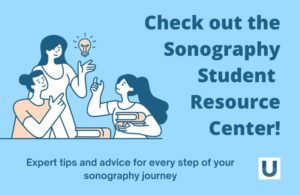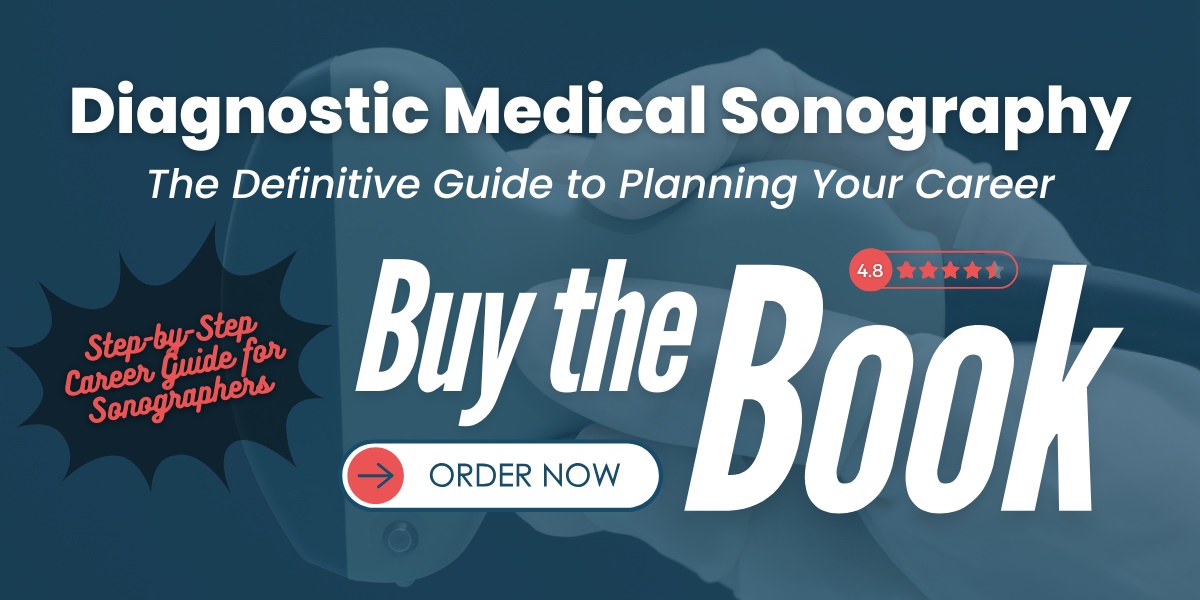To be eligible for entry-level positions, your must have at least an Associate of Science degree with a specialization Diagnostic Medical Sonography. Some universities offer Bachelor’s degrees, which may open the door to more job opportunities with the additional education and possibility of further specialty training. There are also accelerated Certificate programs for students who already hold a degree. Learn more about the various degree programs below.
Sonography degree program options include:
Associate Degree in Sonography
An ultrasound associate degree program typically takes two years of full-time attendance to complete and is the minimum degree required for an entry-level position. Pre-requisites vary from school to school, with a high-school diploma or GED being the minimum. In some cases the completion of several college-level biology and medical terminology courses are required; in other cases, schools require an Allied-health Associates degree in areas such as radiologic technology, physical therapy or nursing or a Bachelors degree in any major.
An Associate’s Sonography Degree is a blend of coursework with hands-on clinical rotations. Many programs will offer the opportunity to specialize in one particular area of the ultrasound profession, such as General (abdominal-extended, obstetrics and gynecology), Vascular or Cardiac.
Bachelors Degree in Sonography
A bachelors degree in sonography is typically a four-year program consisting of pre-professional and professional courses.
Pre-professional courses consist of those required for any Bachelor of Science program with areas of biology, math, computer science, physics or chemistry, as well as social science classes such as liberal arts and communications.
Professional courses delve into several areas of sonography (including gynecology, obstetrics, abdominal-extended, vascular and cardiac) more specialized biology and physics courses (such as sectional anatomy, genetics, pathology and Doppler sonography) and patient-care classes.
A sonography Bachelor Degree program also includes frequent clinical rotations/internships. In most cases, you will be able to specialize in a certain area of sonography in your final one or two years of the program.
When selecting a program, make sure your school offers the specialization or courses in the area of sonography you are interested in pursuing as a career. Also make sure the program is accredited and meets the guidelines for writing the ARDMS exam after graduation.
Learn From the Experts!
DruAusten Fields, RDMS (AB, OB/GYN), RVT is a registered sonographer with experience in abdominal, OBGYN, and vascular ultrasound. What started as a practical interest transformed into a deep passion for the field of sonography.
In her article “The Learning Curve“, Dru takes us through her journey from finding the right program, through her challenges with Clinicals, to becoming an experienced sonographer.

Ultrasound Certificate Programs
Certificates in Sonography are available to individuals who already hold a related AAS degree, or a Bachelor’s degree, often in any field. Certificates typically take between 12 and 24 months to complete, and offer students a way to further specialize their education.
Some certificate options include:
- Cardiac Sonography
- Obstetrics and gynecology
- Pediatric Cardiac Sonography
- Abdominal and Opthalmologic Sonography
- Vascular Sonography
Accreditation of Sonography Degree Programs
The accreditation of the degree program that you wish to apply to is very important. If possible, select one that has received programmatic accreditaiton from the Commission on Accreditation of Allied Health Education Programs (CAAHEP). This will ensure that the education that you receive will meet or exceed industry standards.
Graduating from a program that has been accredited by CAAHEP will qualify you to sit for the Sonography Principles and Instrumentation (SPI) exam, plus a specialty exam, which are administered by the ARDMS. Not all states require that sonographers be certified or licensed, but it’s almost certain that a potential employer will.
Get Real Advice From Sonography Students, Professionals, and Professors
Visit our student resource center for expert articles from top sonographers across the country. Whether you’re just starting out or looking to move up the career ladder, our experts can help.

Online Degree in Sonography
Important components of an ultrasound degree are the experiences working with imaging equipment in the lab and completing clinical rotations. Therefore, be wary of any sonography program that is offered entirely online. It is possible to find some CAAHEP accredited programs that are offered on a hybrid basis.
If you have already completed an Associates degree or certificate program, and have some work experience, then you may be able to complete some courses online, to further specialize in a particular area of sonography, without disrupting your current professional and personal schedule.
 Simulation training, such as the program highlighted in our interview with the Program Chair of Diagnostic Medical Sonography at Pennsylvania College of Health Sciences, is a great example of why an online degree isn’t always the best option.
Simulation training, such as the program highlighted in our interview with the Program Chair of Diagnostic Medical Sonography at Pennsylvania College of Health Sciences, is a great example of why an online degree isn’t always the best option.Some online programs only accept students who are already ARDMS-accredited – meaning they already have their clinical experience. Other schools will offer class work online but will still require students to complete clinical rotations in person.
FAQ’s
Are Scholarships Available?
Yes, to those who qualify. Many scholarships are offered and awarded based on the different needs and qualities of the applicants. In fact, Ultrasound Schools Info has a $1000 scholarship available to students and aspiring sonographers. Click here to learn more information about eligibility, deadlines, and the selection process.
Other merit and needs-based scholarships are often available to students who meet the qualifications. The first step to see whether you qualify for a needs-based application is to go online and complete a Federal Application for Student Financial Aid (FASFA). You will need to know your social security number, and have tax return information available for both yourself, and your parents if applicable.
You will be given a score upon completion of the application, which will be sent to the schools you’re applying for in order to help determine how much aid you might receive.
Merit-based scholarships are based on an academic, athletic, or artistic record in high school. Speak with a guidance counselor at your school (if you’re a current student), and they can help direct you to both local, community scholarships, as well as national merit scholarships.
Some sonography organizations, such as the Society of Diagnostic Medical Sonography (SDMS), and the International Foundation for Sonography and Education Research (IFSER) also offer scholarship to potential or current sonography students. You can research the topic further by visiting our scholarship information portal.
How Much Does a Sonography Degree Program Cost?
Costs for completion of an ultrasound technician program vary widely. Factors including location, accreditation, size of the school, and whether it’s a public or private, non-profit or for-profit school all affect how much the degree will cost. The Consumer Financial Protection Bureau (CFPB) offers a great resource to compare the true costs, and potential financial aid, of completing your degree.
What Are The Entrance Requirements?
A high school diploma or GED is required to apply to an ultrasound technician program, and some schools also require college level math and communications courses, completed within the last 5 years. If you’re still in high school, elective or AP courses in science, biology, and math can be pursued to make you a more qualified applicant.
Guidance counselors in the high school are a valuable resource to help you plan and apply to secondary education. Also, visiting the website of the schools you’re considering applying to will help you gain an understanding of their entrance requirements.


